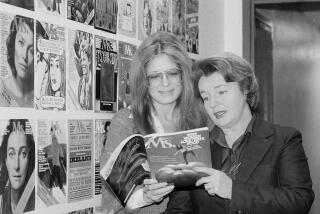NONFICTION - Oct. 3, 1993
- Share via
ONLY WORDS; by Catharine A. MacKinnon. (Harvard: $14.95; 152 pp.) This little book might as well come with a fuse and matches, lighting a fire as it does under the complacent acceptance of pornography and inequality, racial and sexual, in this country. MacKinnon, a law professor at the University of Michigan Law School, has divided the book into three sections: “Defamation and Discrimination,” “Racial and Sexual Harassment” and “Equality and Free Speech.” The first section asks us to imagine that “women’s reality is real,” that the nearly 50% of women in this country who are at some point victims of rape or attempted rape are not imagining it. Now that the camera requires “live fodder” for snuff films and child pornography (to name just a few genres), the idea that pornography is merely a form of speech is unsupportable. Understanding women’s experience as discrimination, rather than mere defamation; pornography as action, not just obscenity, is the point of this section. Defending pornography in the name of free speech ignores the fact that real women and children were used to make it, and that real women and children can be harmed by its audience. In the second chapter, MacKinnon shows, partly through Clarence Thomas’ Senate Confirmation Hearings, how women’s reality collides with a political system and discourse that denies women credibility. Knowing that they have no credibility, women remain silent. “I felt,” writes MacKinnon of Anita Hill’s testimony, “that she did not want his words in her mouth.” The final chapter describes the “collision course” of the First Amendment arguments for free speech and Fourteenth Amendment arguments for equal rights. “The First Amendment has grown as if a commitment to speech were no part of a commitment to equality and as if a commitment to equality had no implications for the law of speech.” Traumatized by the McCarthy era, we protect pornography, hate speech and propaganda as rights, rather than recognize them as threats to equality. “Some people,” MacKinnon reminds, “get a lot more speech than others.”
More to Read
Sign up for our Book Club newsletter
Get the latest news, events and more from the Los Angeles Times Book Club, and help us get L.A. reading and talking.
You may occasionally receive promotional content from the Los Angeles Times.






